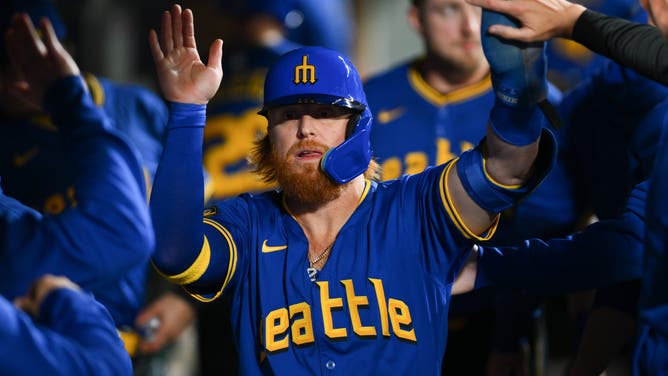Justin Turner Absolutely Roasts Seattle Mariners
Justin Turner was on the Seattle Mariners in the 2024 season, and didn't like what he saw.
Bob Nightengale at USA Today spoke to Turner, who signed with the Chicago Cubs in the offseason, about why Seattle once again missed the postseason. And Turner went off, criticizing the team's ownership and lack of interest in building the best possible team.
His comments mostly centered on the Mariners' unwillingness to build on their dominant pitching staff, one that featured George Kirby, Logan Gilbert, Bryce Miller, Luis Castillo and Bryan Woo. Those five starters were generally healthy and extremely effective. The highest ERA among them was Castillo at 3.64. That's great, setting the foundation for a contending team. Except Seattle's park-adjusted offense ranked near the middle of the league.
It'd be reasonable to ask then, why they didn't go out and add more hitting at the deadline. Or in the offseason. That's what Turner wants to know too.
"The fact that they missed the playoffs by one game, and didn’t go out and add an impact bat or two when you have the best pitching staff in baseball," he told USA Today Sports, "just seems absurd to me."
"Honestly, as much as I wanted to be back there," Turner said, "if I was the only piece they brought back in, I would be saying the same thing: What the hell are we doing? Are you trying?"
"There’s not going to a better time to go for it. So, I don’t know what they’re doing. I’m very confused. It’s a head-scratcher for me."

Sep 14, 2024; Seattle, Washington, USA; Seattle Mariners first baseman Justin Turner (2) celebrates after scoring a run against the Texas Rangers during the second inning at T-Mobile Park. Mandatory Credit: Steven Bisig-Imagn Images
Justin Turner Reveals Biggest Problem With Mariners, Other Organizations
He wasn't done.
Turner told Nightengale that he specifically communicated with the Mariners front office that they had a unique, historic opportunity to make their team into a World Series-contender. All they had to do was add offense to their dominant pitching. And they did nothing.
"I told them several times this offseason, you have a unicorn of a pitching staff," Turner explained. "This might be the best five starting pitchers in the history of the game. I mean, find me a better 5-man. There obviously has been teams that have had elite three guys, right? [Hall of Famers Greg Maddux, Tom Glavine and John Smoltz in Atlanta]. Maybe four guys [Baltimore Orioles’ 20-game winners Jim Palmer, Dave McNally, Bobby Culler and Pat Dobson in 1971]. But five guys?"
"There’s never going to be a better time in the history of that franchise to have added a couple of bats to make a run than this year," he continued, "and they missed it…"
"I thought Alonso was a slam-dunk. How can you not go after him? You kidding me?"
Turner doesn't really blame general manager Jerry DiPoto, saying he has no money to spend on player additions.
"I think Jerry catches a bad rap for a lot of these trades and how crazy some of these trades have been," Turner said. "But now being a part of it, I kind of understand. He doesn’t have any money to spend, so he’s got to create money. Like, OK, is it really Jerry’s fault?"
As if there were any doubts, he also confirmed that the problem lies with ownership.
"I feel for them. They’ve got great fans. Their fans are amazing. They want to win so bad. The team is very profitable. And they don’t spend."
Therein lies the problem with modern baseball. It's not the Dodgers ruining the sport, it's teams like the Seattle Mariners, who play in a solid market, with devoted fans, a great stadium setting, and refuse to take advantage of it. Baseball teams to most owners, are not competitive businesses with a focus on winning. They're profit centers, designed to create exorbitant salaries.
That's fine, team owners can do whatever they want with their money. But acting as if they simply can't add more talent is disingenuous at best and flat out dishonest at worst.
Owners are happy to use fans' frustrations to call for a salary cap that would do nothing to address competitive balance, which doesn't need to be fixed anyway, but would depress player salaries. They're happy to build a team capable of winning the bare minimum number of games to keep fans buying tickets in September. And if the playoffs happen, so be it.
What they're not happy about is calls to actually try to win, to spend more than might be fiscally prudent, since that would jeopardize their extreme profitability. Players get it, fans should too.